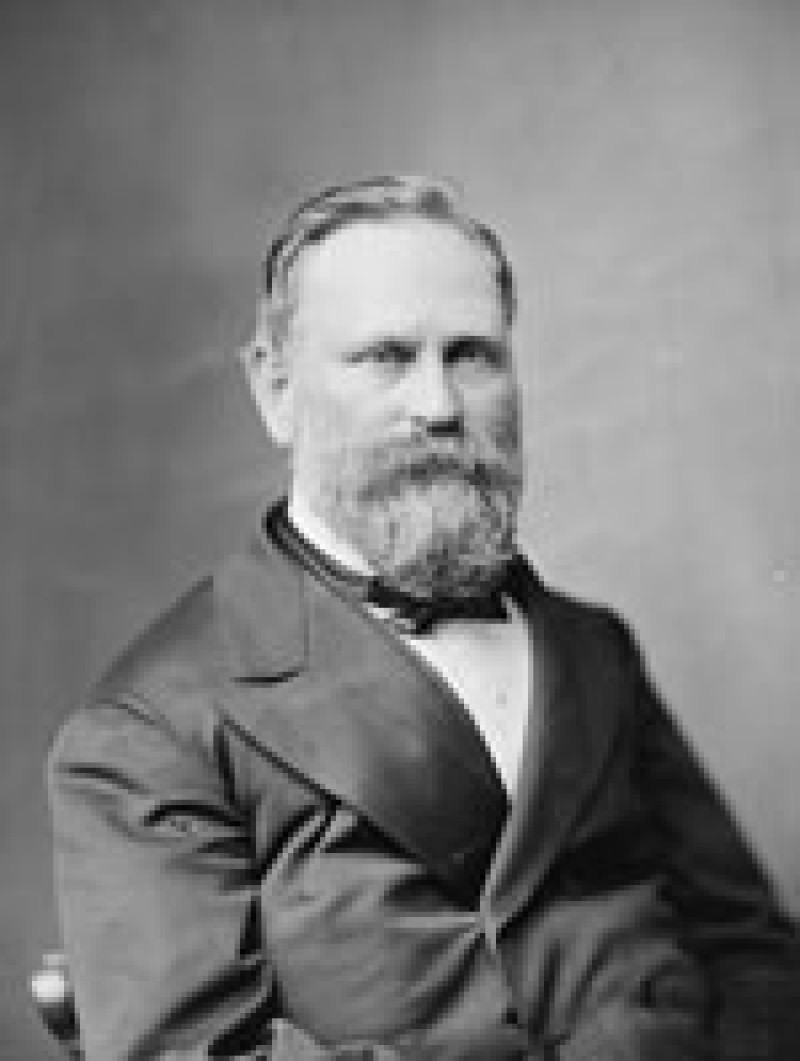Stanley Matthews (July 21, 1824 - March 22, 1889)
Stanley Matthews, U. S. Supreme Court justice, was born in Lexington, Kentucky. Matthews graduated from Kenyon College in 1840, studied law in Cincinnati, and moved to Columbia, Tennessee, where he was admitted to the bar and was active in Democratic politics. In 1844 he returned to Cincinnati, espoused antislavery principles, and, despite that unpopular stance, was elected a judge of the Ohio Court of Common Pleas, where he served from 1851 to 1853. Matthews continued to practice law and was elected to the state Senate, serving from 1855 to 1857. From 1858 through 1861 he was U.S. attorney for the Southern District of Ohio.
In 1861 Matthews joined the Republican party and volunteered for military service. He was commissioned lieutenant colonel of the 23rd Ohio Volunteer Infantry and then colonel in the 51st Ohio Volunteer Infantry. He was provost marshal of Nashville and a brigade commander at Lookout Mountain and Chickamauga. He resigned from the army in 1863 when he was elected judge of the Ohio Superior Court, where he sat until 1865.
Back in private practice, Matthews prospered, representing railroads and other corporate interests. In 1877 he argued the cause of his college and army friend, Rutherford B. Hayes, before the electoral commission. Matthews also helped engineer the Wormley Compromise of 1877, which resolved the disputed 1876 presidential election on the basis of Republican pledges to terminate what was left of military Reconstruction. Republicans in control of the Ohio legislature elected Matthews to the U.S. Senate, where he served until 1879 and, characteristically out of step with his party, supported greenbacks and silver.
In 1881 President Rutherford B. Hayes nominated Matthews to the Supreme Court, but the nomination proved politically controversial and languished in the Judiciary Committee. Newly elected President James A. Garfield resubmitted the nomination, and Matthews was confirmed by a margin of one vote in 1881. He sat until his final illness in 1888 forced him off the bench and he died in Washington, D.C., the next year.
Though Matthews served only seven years and was little differentiated ideologically from his brethren on the court, several of his opinions have lasting significance. In Yick Wo v. Hopkins (1886), Matthews struck down a facially neutral San Francisco ordinance regulating the licensing of laundries on the grounds that it was discriminatorily applied to exclude Chinese laundry men. Yick Wo remained a valuable precedent for voiding laws that were valid on their face but unequally enforced.
Matthews' opinion in Hurtado v. California (1884) was significant not because of innovation or doctrine, but because it opened a question that required 80 years of contentious debate on the court to resolve. He upheld a California criminal procedure whereby proceedings against the defendant could be begun by information filed by the attorney general, rather than by an indictment. This raised the issue of the extent to which the 14th Amendment ?incorporated? the first eight amendments of the Bill of Rights as limitations on the power of the states.
Matthews' holding in Ex parte Crow Dog (1883) followed the precedent established by Chief Justice John Marshall of respecting the quasi-sovereign status of American Indian tribes. Preventing extension of territorial court jurisdiction over American Indians, whom he described as ?members of a community, separated by race, by tradition, by the instincts of a free though savage life,? Matthews sought to preserve the authority of tribal law on the reservations.
Matthews was one of the more progressive jurists on a court that was beginning to formulate doctrines, such as substantive due process, that were hostile to state regulatory power. His realistic approach in Yick Wo was far in advance of its time and marked one of the few occasions before 1950 when the equal protection clause was enforced to protect racial minorities. In his seven years of service on the Supreme Court, Matthews left an enduring mark on American public law.
Biography of Stanley Matthews (July 21, 1824 - March 22, 1889)
Citation: William M. Wiecek. "Matthews, Stanley"; http://www.anb.org/articles/11/11-00562.html; American National Biography Online Feb. 2000. Access Date: Fri Oct 3 10:04:25 2003. Copyright © 2000 American Council of Learned Societies. Published by Oxford Univeristy Press. All Rights Reserved.
Portrait of Stanley Matthews - Library of Congress, Prints & Photographs Division.

